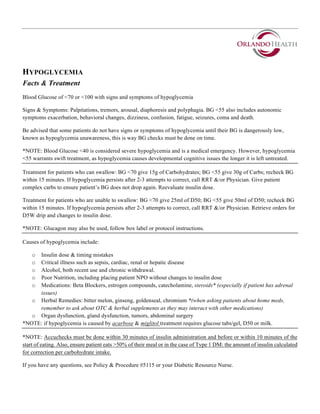Report
Share
Download to read offline

Recommended
More Related Content
What's hot
What's hot (20)
Yusuf Transient & persistent hypoglycemia in neonates

Yusuf Transient & persistent hypoglycemia in neonates
Managing Hypoglycemia & Hyperglycemia Critical Care

Managing Hypoglycemia & Hyperglycemia Critical Care
Viewers also liked
Viewers also liked (6)
Drug induced hepatotoxicity and its regulatory implications

Drug induced hepatotoxicity and its regulatory implications
Similar to Hypoglycemia Quick Guide
Similar to Hypoglycemia Quick Guide (20)
Dr gopal k shah m.d.consultant physician udhana surat gujarat

Dr gopal k shah m.d.consultant physician udhana surat gujarat
Hypoglycemia Quick Guide
- 1. HYPOGLYCEMIA Facts & Treatment Blood Glucose of <70 or <100 with signs and symptoms of hypoglycemia Signs & Symptoms: Palpitations, tremors, arousal, diaphoresis and polyphagia. BG <55 also includes autonomic symptoms exacerbation, behavioral changes, dizziness, confusion, fatigue, seizures, coma and death. Be advised that some patients do not have signs or symptoms of hypoglycemia until their BG is dangerously low, known as hypoglycemia unawareness, this is way BG checks must be done on time. *NOTE: Blood Glucose <40 is considered severe hypoglycemia and is a medical emergency. However, hypoglycemia <55 warrants swift treatment, as hypoglycemia causes developmental cognitive issues the longer it is left untreated. Treatment for patients who can swallow: BG <70 give 15g of Carbohydrates; BG <55 give 30g of Carbs; recheck BG within 15 minutes. If hypoglycemia persists after 2-3 attempts to correct, call RRT &/or Physician. Give patient complex carbs to ensure patient’s BG does not drop again. Reevaluate insulin dose. Treatment for patients who are unable to swallow: BG <70 give 25ml of D50; BG <55 give 50ml of D50; recheck BG within 15 minutes. If hypoglycemia persists after 2-3 attempts to correct, call RRT &/or Physician. Retrieve orders for D5W drip and changes to insulin dose. *NOTE: Glucagon may also be used, follow box label or protocol instructions. Causes of hypoglycemia include: o Insulin dose & timing mistakes o Critical illness such as sepsis, cardiac, renal or hepatic disease o Alcohol, both recent use and chronic withdrawal. o Poor Nutrition, including placing patient NPO without changes to insulin dose o Medications: Beta Blockers, estrogen compounds, catecholamine, steroids* (especially if patient has adrenal issues) o Herbal Remedies: bitter melon, ginseng, goldenseal, chromium *(when asking patients about home meds, remember to ask about OTC & herbal supplements as they may interact with other medications) o Organ dysfunction, gland dysfunction, tumors, abdominal surgery *NOTE: if hypoglycemia is caused by acarbose & miglitol treatment requires glucose tabs/gel, D50 or milk. *NOTE: Accuchecks must be done within 30 minutes of insulin administration and before or within 10 minutes of the start of eating. Also, ensure patient eats >50% of their meal or in the case of Type 1 DM: the amount of insulin calculated for correction per carbohydrate intake. If you have any questions, see Policy & Procedure #5115 or your Diabetic Resource Nurse.
